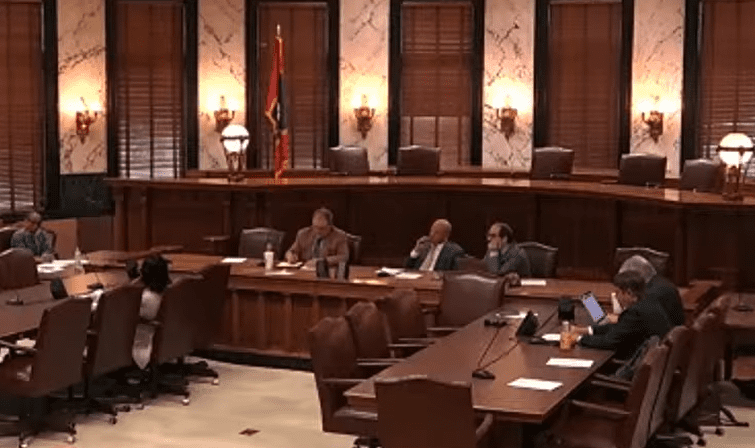
(Photo from Senate Judiciary hearing livestream)
- Michael Carr said defense attorneys would like to see a law where inmates who have not been indicted within 270 days are released.
Attorneys practicing in Mississippi testified before the state Senate Judiciary Committee last week on how to improve the criminal justice system.
Lawmakers and the attorneys agreed the court system is overloaded with cases and understaffed. They also agreed that the state crime lab and the Medical Examiners Office’s forensic pathology reports are backlogged. However, neither should cause people to linger in jail for years.
Michael Carr, a defense attorney in Cleveland, testified that he has clients who sit in jail for years while they wait for the case to be presented to a grand jury.
“In Mississippi, there’s no limitations from arrest to indictment,” Carr told the committee. “There needs to be a statutory window of time from the time someone is arrested, even if they bond or don’t bond, until the case gets to the grand jury or the arrest needs to go away on its own.”
Carr, who practices in nine counties, said in most instances the court system is swamped with cases and lack the personnel to keep up.
These issues are linked to another issue – jail reviews.
When Mississippi finally adopted its Rules of Criminal Procedures in 2016, Rule 8.5 states before every circuit term, a jail review must be conducted by a judge. During that review, a judge is to look at who is in jail, on what charges, see if inmates have legal representation, and determine how long the person has been incarcerated.
However, Carr said at least two circuit districts fail to follow this procedure, naming the 11th and 4th Districts. Calls from Magnolia Tribune to each circuit district went unanswered.
“It’s a great rule,” said Carr. “But it has no teeth. Meaning there’s no repercussions for the judge for not conducting a jail review.”
“That’s a problem,” added Carr.
Carr said defense attorneys would like to see a law where inmates who have not been indicted within 270 days are released.
“That’s a significant period of time, that’s enough time for the District Attorney to get an arrest file from a sheriff’s department or municipal police and to review it,” he said.
For criminal defense attorneys, just obtaining the arrest file can be a challenge, he said.
On numerous occasions, Carr said he called law enforcement officials requesting an arrest file only to hear a response of, “You’re not entitled to it, because it’s an ongoing investigation,” even as his clients spend additional time in jail.
Laurel Brinkley, an assistant District Attorney in the 15th District, agreed that more needs to be done in pre-grand jury criminal matters, saying that to DAs across the state anything to help ease the backlog is appreciated.











